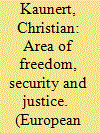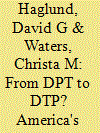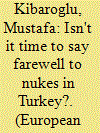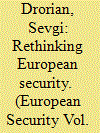| Srl | Item |
| 1 |
ID:
074409


|
|
|
|
|
| Publication |
2005.
|
| Summary/Abstract |
Despite the significant growth the Area of Freedom, Justice and Security (AFSJ) has seen recently, it is still comparatively under-researched. The main argument of the article is that norms have been constructed over recent years in such a way that the AFSJ has set a project in motion which aims to create a veritable 'European Public Order'. This change has not come overnight though, and it has been normatively constructed over the past decade. In agreement with Christiansen, it is argued that a constructivist institutionalist approach may be best suited to analyse these developments, representing one of the new 'high points' of European construction. Four different stages of development are examined, i.e. the pre- and post-Maastricht, the Amsterdam and Tampere, and the Constitutional Treaty phases. These developments have now significantly altered the norm of national sovereignty in EU internal security. As a consequence of this, some of the most spectacular changes in the EU can be expected in this area in the future with the new five-year ASFJ programme agreed in The Hague.
|
|
|
|
|
|
|
|
|
|
|
|
|
|
|
|
| 2 |
ID:
074410


|
|
|
|
|
| Publication |
2005.
|
| Summary/Abstract |
This article asks whether the differing manner in which liberal-democratic allies perceive security threats might prove corrosive to their alliance. In effect, the authors seek to test the assumption that 'democratic alliances' and liberal-democratic security communities are virtually indestructible so long as the members remain liberal democracies. The case chosen for diachronic analysis is the collapse of Anglo-American-French comity in the immediate aftermath of the liberal-democratic allies' victory in the First World War. Argued here is that differential threat perception (or DTP) contributed significantly to the ending of meaningful security cooperation among the group. In this sense, DTP seems to have weakened the conceptual underpinning of the democratic alliance implied by democratic peace theory (or DPT).
|
|
|
|
|
|
|
|
|
|
|
|
|
|
|
|
| 3 |
ID:
074408


|
|
|
|
|
| Publication |
2005.
|
| Summary/Abstract |
The attitude of Turkish officials toward the US nuclear weapons deployed in Turkey for over four decades has been static. Officials have understandable arguments, based on their threat analysis, as to why these weapons should be retained in Turkey. However, since the 9/11 terrorist attacks, the international security environment has undergone radical changes. The classical deterrent value of nuclear weapons no longer applies with these emerging threats. At the same time, there is an increased probability of unauthorized use of crude radiological devices or nuclear weapons by terrorist organizations. In addition to increased security at storage sites, bolder steps must be taken by concerned countries to get rid of nuclear weapons. Such steps should begin with drawing-down US nuclear weapons deployed in allied countries including Turkey.
|
|
|
|
|
|
|
|
|
|
|
|
|
|
|
|
| 4 |
ID:
074407


|
|
|
|
|
| Publication |
2005.
|
| Summary/Abstract |
Security agendas in Europe have gone through some striking modifications over the last couple of decades, reflecting changes in both the nature and the scope of post-Cold War security concerns. While the traditional security concerns have not completely disappeared, new sources of insecurity and instability have emerged out of the post-Cold War politico-strategic environment in Europe's peripheries. Turkey sits at the nexus of this hitherto marginalized theatre of risks and challenges. Thus, while investigating this new and broader security environment for Europe and then locating Turkey's role and place in such milieu, this article argues that Turkey has a critical role to play in this endeavour of achieving security and stability in both Europe and its surrounding regions.
|
|
|
|
|
|
|
|
|
|
|
|
|
|
|
|